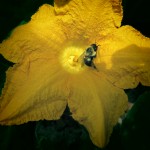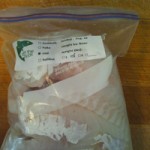Pollinators are an indispensable natural resource, their daily work is essential for the production of food. These beneficial insects are under pressure from loss of habitat, loss of food sources, disease, and pesticides.
As insect populations are threatened, so are the fruit and vegetable produce, and the wild ecosystems that depend on these pollinators.
The (non-native) honey bee is probably the most well-known pollinator, however, did you know that there are over 800 known native species of bees in Canada?, plus there are many pollinating flies, butterflies and other insects that can do this important work.
There are many ways you can help support our native pollinators…
(1) Leave undisturbed areas in your garden. Many native bees are ground nesters, so leaving a few bare patches will invite them to raise their families! Leave some uncultivated patches through the Fall into the Spring. http://nativeplantwildlifegarden.com/pollinators-and-the-garden-in-winter/
(2) Go organic! Don’t use chemicals in or around your garden. The stuff that’s used to kill off pests also kills beneficial insects. http://beyondpesticides.org/pollinators/pollinators.pdf
(3) Leave debris, such as dried stalks (especially those with hollow centers) and leaf litter in your garden for pollinators and other beneficial garden insects like ladybugs and spiders, to overwinter. You can also build an insect hotel, which is basically a big pile of said debris (I use sunflower stalks as they make great dwellings and don’t compost well anyway). http://www.bbcwildlife.org.uk/sites/birmingham.live.wt.precedenthost.co.uk/files/Insect%20Hotel.pdf
(4) Build nativebee house structures which you can erect in and around your garden. These bee condos mimic natural habitat for overwintering, such as dead wood. http://habitat.ms11.net/bee/beehome.htm#_Solitary_Bee_House
(5) Create a pollinator gardennext to your vegetable garden. These are permanent (no-till) gardens consisting of native perennial plants, mostly wildflowers, which attract and feed our pollinator friends. Fall is a perfect time to plant or transplant perennial flowers, as well as to sow wildflower seed. Doing so will help provide habitat for the many wild pollinator insects that are native to Nova Scotia.
For more information on establishing a pollinator garden and on supporting our native pollinators see Pollination Canada: http://www.pollinationcanada.ca/ and the Canadian Wildlife Federation: http://cwf-fcf.org/en/discover-wildlife/gardening/gardening-for-wildlife.html
Written by Su Morin, Community Food Coordinator (Cumberland), Ecology Action Centre



